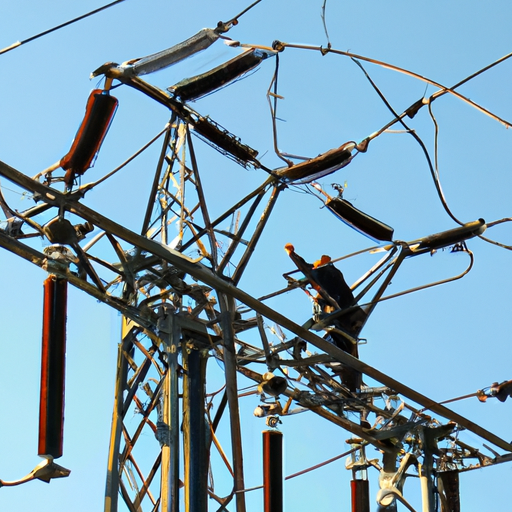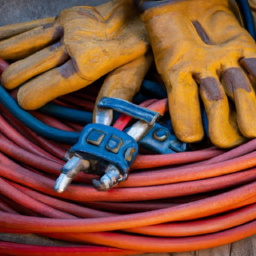Are you interested in a career as a lineman but don’t know where to start? Look no further! “How to Obtain a Lineman Certification” is the ultimate guide that will walk you through the process step by step. Whether you’re new to the field or looking to advance your skills, this comprehensive resource covers everything you need to know to obtain your lineman certification. From the necessary qualifications to the training programs available, this product is your go-to source for all things lineman certification. Get ready to take your career to new heights!
## Overview
### What is a lineman certification?
A lineman certification is a professional credential that verifies an individual’s knowledge and skills in the field of electrical power line installation, maintenance, and repair. It serves as proof that you have undergone the necessary training and have met the industry standards for safe and efficient work as a lineman.
### Why is lineman certification important?
Obtaining a lineman certification is important for several reasons. Firstly, it increases your job prospects and makes you more competitive in the job market. Many employers in the electrical power industry require their linemen to have a certification.
Secondly, lineman certification ensures that you have the necessary knowledge and skills to work safely and effectively in a high-risk environment. The training and coursework involved in obtaining a certification cover important topics such as electrical safety and regulations, power distribution systems, and emergency response.
Furthermore, a lineman certification demonstrates your commitment to the profession and your dedication to continuous learning and professional development. It shows potential employers and clients that you take your work seriously and are willing to go the extra mile to provide high-quality service.
## Requirements
### High school diploma or GED
One of the basic requirements for obtaining a lineman certification is a high school diploma or its equivalent, such as a General Education Development (GED) certificate. This requirement ensures that candidates have a foundational level of education and can understand the coursework and training materials.
### Physical fitness
Working as a lineman is physically demanding, often involving climbing poles and working at heights. Therefore, physical fitness is an important requirement for obtaining a lineman certification. Candidates should be able to meet the physical demands of the job and pass any physical fitness tests or assessments required by the certification program.
### Technical skills
Linemen work with various equipment and tools, such as power lines, transformers, and electrical meters. Therefore, having basic technical skills and knowledge is essential for obtaining a lineman certification. Candidates should have a basic understanding of electrical systems and be familiar with common tools and equipment used in the field.
### Safety training
Safety is a top priority in the field of electrical power line work. Lineman certification programs require candidates to undergo safety training to ensure they are aware of potential hazards and know how to work safely in high-risk environments. This training typically covers topics such as personal protective equipment (PPE), electrical safety protocols, and emergency response procedures.
## Finding a Lineman Certification Program
### Researching different programs
When searching for a lineman certification program, it is important to research and compare different options. Look for programs that have a good reputation and a track record of producing well-trained linemen. Consider factors such as the program’s curriculum, faculty qualifications, and industry partnerships.
### Accreditation and certification
It is important to choose a lineman certification program that is accredited by a reputable organization. Accreditation ensures that the program meets certain standards of quality and rigor. Additionally, some states or regions may have specific certification requirements, so make sure the program you choose aligns with those requirements.
### Cost and financial assistance
Consider the cost of the lineman certification program and any financial assistance options that may be available. Some programs offer scholarships, grants, or tuition reimbursement programs. Look into these opportunities to help offset the cost of the program and make it more affordable.
## Application Process
### Application requirements
Once you have identified a lineman certification program, familiarize yourself with the application requirements. These requirements may include submitting a completed application form, providing proof of education (such as a high school diploma or GED certificate), and paying an application fee. Be sure to gather all necessary documents and information before submitting your application.
### Submitting the application
Submit your completed application and all required documents according to the program’s instructions. Follow any specific guidelines regarding submission methods (e.g., online application portal, mail, or in-person). Double-check to ensure that all required documents are included and that your application is complete.
### Waiting period and acceptance
After submitting your application, there may be a waiting period before you receive a decision from the certification program. During this time, the program will review your application and assess your eligibility. Once a decision has been made, you will be notified of your acceptance or rejection. If accepted, you will be given further instructions on how to proceed with the certification process.
## Lineman Certification Coursework
### Introduction to electrical systems
A fundamental part of lineman certification coursework is an introduction to electrical systems. This module covers the basics of electricity, including electrical circuits, conductors, and basic electrical calculations. It provides a foundation for understanding how power lines and electrical systems work.
### Climbing and working at heights
Working as a lineman often involves climbing poles and working at significant heights. Therefore, lineman certification programs include training on climbing techniques, safety harnesses, and proper fall protection. This coursework ensures that linemen are prepared to work safely and confidently at heights.
### Electrical safety and regulations
Safety is paramount in the field of electrical power line work. Lineman certification coursework covers important safety protocols and regulations to ensure that linemen are aware of potential hazards and know how to minimize risks. This training includes topics such as personal protective equipment (PPE), lockout/tagout procedures, and electrical grounding.
### Power distribution systems
Understanding power distribution systems is critical for linemen. Lineman certification coursework provides a comprehensive overview of electrical grids, transformers, distribution lines, and other components of power distribution systems. This knowledge allows linemen to effectively troubleshoot and maintain power distribution infrastructure.
### Equipment operation and maintenance
Linemen work with a variety of equipment and tools. A lineman certification program includes instruction on the operation, maintenance, and safe handling of this equipment. Linemen learn how to use tools like bucket trucks, wire grips, and voltage detectors properly. They also learn how to perform routine maintenance and inspections on these tools.
### Emergency response and first aid
In the field of electrical power line work, emergencies can happen. Lineman certification coursework includes training on emergency response and first aid. Linemen learn proper procedures for handling incidents such as electrical accidents, natural disasters, and medical emergencies. This training ensures that linemen are able to respond appropriately and effectively in emergency situations.
## Hands-on Training
### Practical exercises and simulations
Hands-on training is a crucial component of lineman certification programs. This training includes practical exercises and simulations that allow candidates to apply their knowledge and skills in real-world scenarios. Examples of hands-on exercises may include pole climbing practice, wire installation and repair, and equipment operation under supervision.
### Equipment operation and maintenance
Hands-on training also focuses on equipment operation and maintenance. Linemen have the opportunity to practice using various tools and equipment they will encounter in their work. Proper operation, maintenance, and troubleshooting techniques are emphasized to ensure that linemen are proficient in handling the tools of their trade.
### Live wire work
Once candidates have demonstrated competency in simulated scenarios, they may progress to live wire work under the supervision of experienced professionals. This hands-on experience exposes candidates to the real-world challenges and conditions they will encounter as linemen. It provides an opportunity to apply their skills in a controlled yet authentic environment.
## Exam Preparation
### Reviewing coursework materials
Exam preparation for lineman certification involves reviewing the coursework materials covered in the program. Go through your notes, textbooks, and any additional study materials provided by the program. Pay special attention to key concepts, formulas, and safety protocols.
### Practice tests and study guides
Practice tests and study guides are valuable resources for exam preparation. Many lineman certification programs provide practice exams that simulate the format and content of the actual certification exam. These practice tests allow you to gauge your readiness and identify areas where you may need additional study.
### Mock practical exams
In addition to written exams, lineman certification programs may include mock practical exams as part of the preparation process. These exams simulate hands-on scenarios, allowing candidates to demonstrate their skills and knowledge in a controlled environment. Mock practical exams help build confidence and ensure that candidates are ready for the real-life challenges they will face in their work.
## Lineman Certification Exam
### Scheduling the exam
Once you have completed all the required coursework and preparation, you can schedule your lineman certification exam. Follow the instructions provided by the certification program to select a suitable date and location for the exam. Make sure to allocate sufficient time for further studying and review, if needed.
### Exam format and content
The lineman certification exam typically consists of both written and practical components. The written portion assesses your knowledge of electrical systems, safety protocols, and industry regulations. The practical portion evaluates your ability to perform tasks and solve problems related to electrical power line work. The specific format and content of the exam may vary depending on the certification program.
### Passing score and retakes
To obtain a lineman certification, you must achieve a passing score on the exam. The passing score is determined by the certification program and may vary. If you do not pass the exam on your first attempt, most programs allow for retakes. Take advantage of any feedback provided and use it to identify areas for improvement before attempting the exam again.

## Certification Renewal and Continuing Education
### Renewal requirements
Lineman certifications are typically valid for a certain period, such as five years. To maintain your certification, you will need to fulfill renewal requirements. These requirements may include completing a certain number of continuing education credits, demonstrating ongoing professional development, or passing a renewal exam. Be sure to keep track of your certification expiration date and start planning for renewal well in advance.
### Continuing education options
Continuing education is an important aspect of professional growth and maintaining a lineman certification. There are various options for continuing education, such as attending workshops and seminars, taking advanced courses, or participating in industry conferences. These opportunities allow linemen to stay up-to-date with the latest industry trends and developments.
## Conclusion
Obtaining a lineman certification is a significant step towards a rewarding career in the electrical power industry. It ensures that you have the necessary knowledge, skills, and safety training to work as a lineman. By meeting the requirements, completing the coursework, and passing the certification exam, you demonstrate your commitment to professionalism and continuous learning. Keep in mind that linemen often work in challenging and potentially dangerous environments, so it is crucial to prioritize safety and stay current with industry best practices through continuing education. With the right training and certification, you can embark on a fulfilling career as a lineman.








